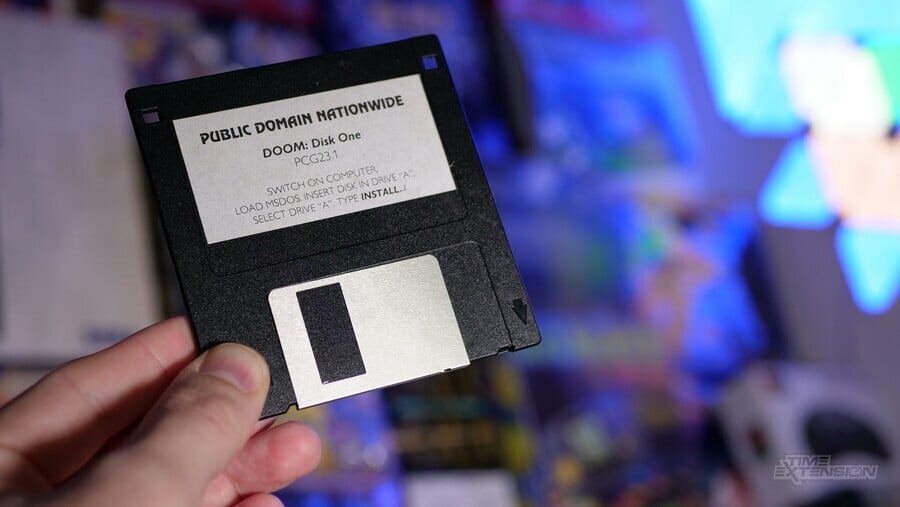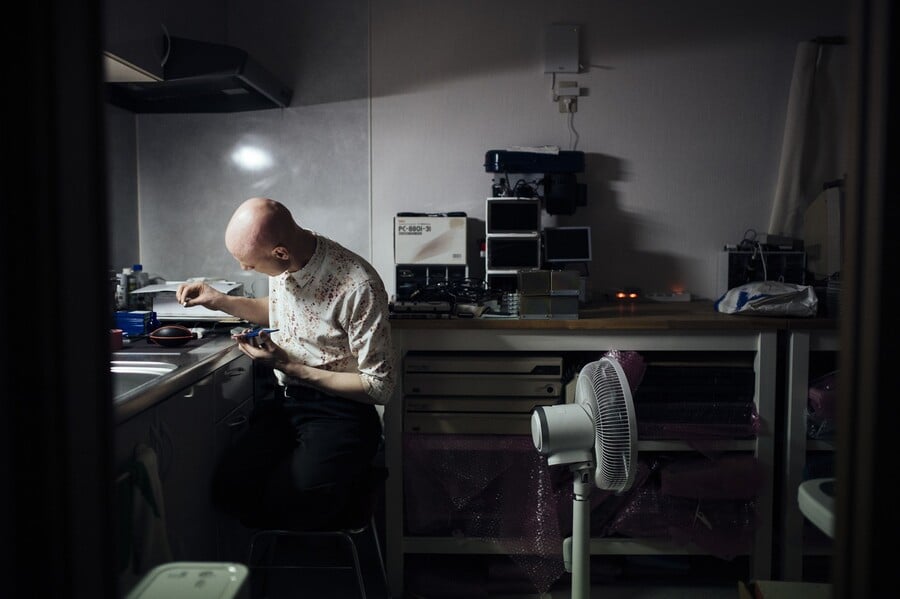
We've already covered how all our beloved consoles are in a state of entropy, but these are actually quite sturdy and with plenty of longevity compared to magnetic media such as floppy disks.
Given that the Japanese government recently announced a desire to phase out floppy disks, we thought it pertinent to look at this statement from Joseph Redon, head of Japan's Game Preservation Society, where he describes trying to preserve games on floppies:
We mostly concentrate on computer games because they are the weakest. With the Famicom, even in 20 or 30 years, you will still be able to preserve the cartridges. But for floppy disks, in some ways, it's already too late. Floppy disks are even weaker than cassette tapes. We should have started this 10 or 20 years ago. How much time do we have left? I don't know. Maybe for some games, it's too late, maybe for some, we still have 10 years. No one knows.
Unfortunately, I think in 10 years there is nothing more we can preserve because we're out of time. If there is a huge movement for preserving computer games this will have to start now and it will have to be intense, with many people working every day. It cannot just be random people, because floppy disks are delicate, they need cleaning, and if you don't handle disks correctly you will kill it. Our priority is fragile materials that are damaged by time every day, so the priority is floppies.
I would say maybe between 20% or 30% of computer games are already lost. Maybe in 10 years you'll ask me the same question and I'll say, unfortunately, it's 40%. Or alternatively, because we found them and we had the opportunity, time, money, and so on, to preserve them, we only lost 15%. I don't know, but I would say at least 20% is already lost.
That's a scary prediction. But at least we still have 10 years, right readers? Wrong.

That statement was made in October 2013, nearly a decade ago, in an interview for The Untold History of Japanese Game Developers books. We have crossed the threshold of time, and each day that a floppy continues to function is a new milestone. Just because your disk #22 from The Secret of Monkey Island, kept in at optimal temperatures and humidity, happens to work today, doesn't mean it will work tomorrow or that the preceding 21 disks are still working. These things are operating way beyond what was originally envisioned.
If you've any interest in Japanese computer games, you've probably seen the Neo Kobe Sets, meticulously curated archives aiming to contain (almost) every game for each computer platform, in English. These archives were created by groups of passionate fans, and we spoke to the mysterious organiser, Kobushi, who agreed with Joseph's sentiment:
It's not just the fragility of the old floppy games, but also their rarity. Nihon Falcom's Xanadu was famous for being the best-selling Japanese computer game of the era and sold around 400,000 copies. But that figure represents the combined sales of nearly a dozen different versions of the game for various computer systems (Sharp X1, NEC PC-8801/9801, Fujitsu FM-7/FM-77, MSX, etc.) It may sound like a lot, but 400,000 copies, the absolute best-selling Japanese computer game of the 1980s and 1990s, doesn't even break into the top 50 best-selling Famicom titles. If you're trying to preserve a less-popular game for one of the less-popular computers, you're faced with the challenge of obtaining disks that only ever had a few thousand copies in circulation. Doujin soft, which were typically copied manually by the creators and sold at regional computer fairs, might have less than 100 copies total. The sad fact is that some of the games are already lost forever.
We also spoke to Ashley Day, the former Retro Editor of gamesTM magazine and the man behind Games From The Black Hole. He's an avid collector of floppy-based titles and paints a rather dim picture of the state of the collector's market for such titles:
As a collector of old computer games, disk rot is a real headache. I collect original games for both Amiga and MSX, and whenever I buy something online it feels like a complete gamble! I’ve been unlucky quite a few times and received disks that simply no longer function. Sometimes the evidence is visible on the disks themselves, other times you won’t know until you pop it in the drive and hear a terrible screeching noise as the drive head struggles against the dirty disk.
Earlier this year, I ordered the late-era MSX shoot-‘em-up, Famicle Parodic and its sequel from Yahoo Auctions in Japan. The first game was released on cartridge and worked perfectly, while the rarer and more expensive sequel was floppy disk only. I was so excited to get both games at once, and utterly disappointed that the sequel didn’t work at all. Do I roll the dice on buying another copy to see what happens or do I duplicate a working disk on a blank floppy and stick it in the box?
There are plenty of viable alternatives to play games on original hardware these days, so it’s not a complete loss. But if, like me, you prefer as authentic an experience as possible, disk rot is a very real and very expensive hazard.
Given that the Game Preservation Society has recently celebrated its 10th year anniversary, we went back to Joseph Redon to ask how he feels today, looking back on the statement he made in 2013:
The 20% lost games figure, after 10 years, is unfortunately a reality. On the bright side this 20% figure has not increased, as we thought it might. We've been able to add further games to our archives, although the pace was slow - not a lot pop up on auctions. The reason we didn't fill all the gaps is we discovered every week some games that are unfortunately dead; you cannot say a game is really secured until it's digitally preserved. However, the archive at GPS headquarters is kept in good condition and I am confident that during the last 10 years most magnetic media (floppies and cassette tapes) were well preserved. In short, we invested to buy ourselves time and it was a wise decision.
As for the future? Every piece of magnetic media, especially floppies, is living on borrowed time. Even stored consistently at the perfect temperature and humidity, they are biodegrading and need to be digitally archived. Thanks to the work of Joseph Redon and archivists around the world, a lot has been saved.
For the low-print rarities, we have to hope someone, somewhere, digs out an old copy and doesn't simply bin it.
Please note that some external links on this page are affiliate links, which means if you click them and make a purchase we may receive a small percentage of the sale. Please read our FTC Disclosure for more information.






Comments 7
I have a disk box full of Amiga games and Amstrad 6128 Discs, that I haven’t tried for over 10 years.
I have boxes of C64 disks that havent been tested for god knows how long, They are all probably useless. Is there anywhere I can donate them? For them to back up? If they still work obviously
Thank God for Mame, for me game preservation is all about the Arcade scene. Just think about all those cabs, and pcbs that have been destroyed over the decades lost forever. Mame is a time capsule of preservation for loads of amazing stuff which I would never get the chance to play ever!!
Oof, i hate floppy disks, in the olden days (25 or so years ago), i'd copy games onto floppies (Well, the 3.5 inch ones) at a friend's house, and half the time, at least one file ended up corrupted and the whole game useless when i got home.
I still have a few floppies, more as mementos of a bygone age than out of any expectation that there's still any usable data on any of them.
"Good old days" my backside...
I have a few old text based floppy games that i need to check. Trying to dig out all of my media and back it up.
Isn't this mostly just scaremongering? Who is using their floppy discs to install games like Monkey Island and not use ScummVM.
You're probably talking about a relative handful of people in the whole world in reality.
And while game preservation is important, I don't think 100% preservation needs to be the goal, or the metric we judge by. It's good to let some things die else we just end up hoarding more and not letting go, which is healthy behaviour.
Since i never had a pc the last time i used floppies was when i had a Pro Fighter in the early nineties for my American SNES.
How am i going to play Super Nintendo games now!?!
Show Comments
Leave A Comment
Hold on there, you need to login to post a comment...